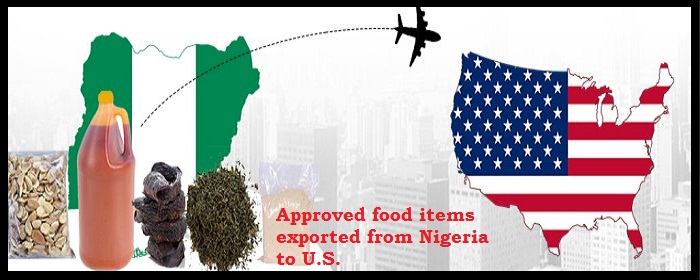
Approved food items exported from Nigeria to U.S.
Approved food items exported from Nigeria to U.S. – Due to the increasing number of Nigerians living in the United States and other European nations, there is a high demand for Nigerian-made food. As a result, there are numerous opportunities for shipping food globally. While the exportation of food from Nigeria to the USA might introduce an alluring business sector, there are difficulties in accomplishing progress in the business. However, you must entrust your shipping requirements to a reputable international shipping firm.
Contents
- 1 Cessummit business tips:
- 1.1 Approved food items exported from Nigeria to U.S.
- 1.2 What is Food Export Items?
- 1.3 Approved food items exported from Nigeria to U.S.
- 1.4 Safety and Quality of Food Item Exports:
- 1.5 Approved food items exported from Nigeria to U.S.
- 1.6 Country Regulatory and Inspection programs for food item exports:
- 1.7 Approved food items exported from Nigeria to U.S.
- 1.8 Nigeria’s Regulatory and Inspection programs:
- 1.9 Approved food items exported from Nigeria to U.S.
- 1.10 Now, food items exported from Nigeria to the U.S.:
- 1.11 Approved food items exported from Nigeria to U.S.
- 1.12 So, what food items does Nigeria export to US?
- 1.13 Food items not allowed into the US from Nigeria:
- 1.14 How to export foodstuff from Nigeria to the USA:
- 1.15 So, how do Nigerian exporters package foodstuffs for export?
- 1.16 Approved food items exported from Nigeria to U.S.
- 1.17 Read Also:
- 1.18 Summing Up”:
- 1.19 Share this:
- 1.20 Like this:
Cessummit business tips:
For more information about Export and Import business that may be available to you, you must bookmark this page. We provide Business Plans, leadership training, and more. Also, at cessummit.com, we help our readers and clients to identify business opportunities and give you business ideas. Furthermore, we can help you with CAC documentation and more.
Approved food items exported from Nigeria to U.S.
What is Food Export Items?
Food export items refer to food products that are produced in one country and are exported to other countries for consumption. These items can include a wide range of food products, such as fruits, vegetables, grains, meat, dairy, seafood, and processed foods.
Food export items are an important part of the global economy, as they allow countries to access a diverse range of food products that they may not be able to produce themselves due to climate, geography, or other factors. Food exporting countries benefit from increased revenue and job creation, while importing countries benefit from access to a wider variety of food products and potentially lower prices.
However, the trade of food export items is also subject to regulations and standards to ensure the safety and quality of the products being traded. Different countries have different regulations and standards, which can sometimes create barriers to trade.
Approved food items exported from Nigeria to U.S.
Safety and Quality of Food Item Exports:
Ensuring the safety and quality of food export items is essential for protecting public health, maintaining consumer confidence, and facilitating international trade. Different countries may have different regulatory standards and requirements for food exports, so it is important for exporters to understand and comply with the regulations of the importing country.
Some of the key factors that can affect the safety and quality of food exports include:
- Foodborne illnesses: Foodborne illnesses can result from the consumption of contaminated food products. Exporters must take steps to ensure that their products are free from harmful contaminants, such as bacteria, viruses, and parasites.
- Chemical contaminants: Chemical contaminants, such as pesticides and heavy metals, can also pose a risk to consumer health. Exporters must ensure that their products meet established limits for these contaminants.
- Allergens: Many people have food allergies or intolerances, and exporters must ensure that their products are accurately labeled to prevent accidental exposure to allergens.
- Shelf life: Exporters must ensure that their products have an appropriate shelf life and can withstand the conditions of transportation and storage.
- Packaging and labeling: Proper packaging and labeling are essential for ensuring that food export items are safe and meet regulatory requirements. Labels should accurately reflect the ingredients, nutritional content, and other important information about the product.
Approved food items exported from Nigeria to U.S.
To ensure the safety and quality of food export items, many countries have established regulatory bodies and inspection programs. Exporters can work with these organizations to ensure that their products meet the necessary standards and regulations for export.
Country Regulatory and Inspection programs for food item exports:
Different countries have established regulatory and inspection programs to ensure the safety and quality of food item exports. Here are some examples:
- United States: The United States Department of Agriculture (USDA) and the Food and Drug Administration (FDA) are responsible for regulating and inspecting food exports from the United States. The USDA oversees the safety and quality of meat, poultry, and processed egg products, while the FDA regulates all other food products.
- European Union: The European Union (EU) has established a comprehensive regulatory framework for food safety, which includes regulations for food exports. The European Food Safety Authority (EFSA) is responsible for providing scientific advice and risk assessments related to food safety, while the European Commission oversees the implementation of food safety regulations.
- China: The General Administration of Customs of the People’s Republic of China (GACC) is responsible for regulating and inspecting food exports from China. The GACC is responsible for ensuring that food exports meet the safety and quality standards of the importing country.
- Australia: The Department of Agriculture and Water Resources (DAWR) is responsible for regulating and inspecting food exports from Australia. The DAWR is responsible for ensuring that food exports meet the safety and quality standards of the importing country.
- Canada: The Canadian Food Inspection Agency (CFIA) is responsible for regulating and inspecting food exports from Canada. The CFIA is responsible for ensuring that food exports meet the safety and quality standards of the importing country.
Approved food items exported from Nigeria to U.S.
These are just a few examples of regulatory and inspection programs for food item exports. Each country may have its own regulatory framework and inspection program, so it is important for exporters to understand the requirements of the importing country and work with the appropriate regulatory authorities to ensure compliance.
Nigeria’s Regulatory and Inspection programs:
In Nigeria, the National Agency for Food and Drug Administration and Control (NAFDAC) is responsible for regulating and inspecting food exports. NAFDAC is an agency under the Federal Ministry of Health that is responsible for ensuring that food products exported from Nigeria meet the safety and quality standards of the importing countries.
NAFDAC operates a food safety and quality control system that includes the following components:
- Registration: All food exporters in Nigeria must register with NAFDAC and obtain a certificate of registration.
- Inspection: NAFDAC conducts regular inspections of food production facilities to ensure compliance with regulatory standards.
- Testing: NAFDAC conducts laboratory testing of food products to ensure that they meet the necessary safety and quality standards.
- Enforcement: NAFDAC has the authority to seize and destroy food products that do not meet regulatory standards.
Approved food items exported from Nigeria to U.S.
NAFDAC also works with other regulatory agencies in Nigeria, such as the Standards Organisation of Nigeria (SON), to ensure that food exports meet the necessary standards and requirements.
In addition to NAFDAC’s regulatory and inspection programs, the Nigerian Export Promotion Council (NEPC) is responsible for promoting and facilitating the export of non-oil products, including food products, from Nigeria. The NEPC provides support to exporters in areas such as market research, product development, and trade facilitation.
Now, food items exported from Nigeria to the U.S.:
Food items exported from Nigeria to the United States are subject to the regulatory and inspection programs of both countries. The Nigerian regulatory body responsible for ensuring the safety and quality of food exports is the National Agency for Food and Drug Administration and Control (NAFDAC), while the regulatory body in the United States is the Food and Drug Administration (FDA).
Exporters of food items from Nigeria to the United States must comply with the regulatory requirements of both countries. This includes obtaining the necessary licenses and certifications, as well as meeting the safety and quality standards of both countries.
The FDA has established specific requirements for food imports into the United States, which include:
- Prior Notice: All food imports into the United States must be preceded by a prior notice filed with the FDA.
- Foreign Supplier Verification Program (FSVP): U.S. importers must develop and implement an FSVP to ensure that their foreign suppliers meet the same safety and quality standards as domestic suppliers.
- Labeling Requirements: Food imports must comply with U.S. labeling requirements, which include information about the product’s ingredients, nutritional content, and country of origin.
- Importer Accountability: Importers are responsible for ensuring that their food imports meet U.S. regulatory requirements.
Approved food items exported from Nigeria to U.S.
In addition to these requirements, the FDA may also conduct inspections of food imports to ensure compliance with regulatory standards. Therefore, Nigerian food exporters must be aware of these requirements and work with their importers and the regulatory agencies in both countries to ensure compliance and a smooth trade process.
So, what food items does Nigeria export to US?
Nigeria exports a variety of food items to the United States, including:
- Cocoa: Nigeria is a major producer of cocoa beans, and exports significant quantities to the United States.
- Sesame seeds: Nigeria is also a major producer and exporter of sesame seeds, which are used in a variety of food products.
- Cashew nuts: Nigeria is one of the largest producers of cashew nuts in the world, and exports significant quantities to the United States.
- Pineapples: Nigeria exports fresh and canned pineapples to the United States.
- Spices: Nigeria exports a variety of spices, including ginger, garlic, and chili pepper, to the United States.
- Shea butter: Nigeria is a major producer and exporter of shea butter, which is used in cosmetics and food products.
- Processed foods: Nigeria also exports processed foods, such as yam flour and cassava chips, to the United States.
These are just a few examples of the food items that Nigeria exports to the United States. The exact types and quantities of food exports can vary depending on factors such as market demand and seasonal availability.
Food items not allowed into the US from Nigeria:
There are certain food items that are not allowed to be imported into the United States from Nigeria. Some of these prohibited items include:
- Bushmeat: The importation of bushmeat, which includes meat from wild animals such as monkeys and bats, is prohibited in the United States due to concerns about diseases such as Ebola.
- Belacan: This fermented shrimp paste, which is commonly used in Nigerian cuisine, is not allowed to be imported into the United States due to concerns about food safety and the potential for the spread of diseases.
- Non-FDA Approved Agricultural Products: Certain agricultural products that have not been approved by the FDA are not allowed to be imported into the United States. This includes some varieties of fruits and vegetables.
- Food Products Containing Harmful Additives: Food products that contain harmful additives, such as certain types of food dyes and preservatives, are not allowed to be imported into the United States.
- Adulterated or Contaminated Food: Food products that are adulterated or contaminated with harmful substances, such as pesticides or heavy metals, are not allowed to be imported into the United States.
It’s important for Nigerian food exporters to be aware of these restrictions and to comply with all applicable regulations and requirements when exporting food items to the United States.
How to export foodstuff from Nigeria to the USA:
Exporting foodstuff from Nigeria to the United States can be a complex process, but here are some general steps to follow:
- Identify the food product to export: Identify the food product(s) you wish to export. Research the specific regulatory requirements and restrictions for that product in both Nigeria and the United States.
- Obtain the necessary licenses and certifications: Before exporting any food product, it’s important to obtain the necessary licenses and certifications. It must be from the regulatory agencies in both Nigeria and the United States. This may include a Certificate of Origin, a Phytosanitary Certificate, and a Certificate of Free Sale.
- Comply with food safety and quality standards: Ensure that the food product(s) meet the necessary safety and quality standards. This may include lab testing and quality control measures.
- Find a reliable importer: Identify a reliable importer in the United States. He must be familiar with the regulatory requirements for importing food products. The importer can help you navigate the regulatory process and ensure compliance with all necessary regulations.
- Obtain necessary permits and clearances: Work with the importer to obtain necessary permits and clearances. This include prior notice to the FDA, and comply with U.S. labeling requirements.
- Shipping and logistics: Arrange for shipping and logistics, including packing, transportation, and insurance.
- Ensure compliance with regulations: Ensure compliance with all applicable regulations and requirements in both Nigeria and the United States. This may include inspections and audits by regulatory agencies.
Overall, exporting foodstuff from Nigeria to the United States requires careful planning and compliance with regulatory requirements in both countries. Working with a knowledgeable importer and regulatory agencies can help ensure a successful export process.
So, how do Nigerian exporters package foodstuffs for export?
Nigerian exporters of foodstuffs package their products in a way that meet the required standards for quality and safety. Also, must be able to withstand the rigors of transportation. Here are some common packaging methods used by Nigerian foodstuff exporters:
- Bags: Many foodstuffs, such as grains, beans, and spices, are often packaged in bags. The bags are made of materials like jute, polypropylene, or woven plastic. These bags are usually labeled with product information and may be sealed with stitching, staples, or heat.
- Cartons: Processed foods like yam flour, and cassava chips are often packaged in cartons made of cardboard or corrugated paperboard. These cartons may be lined with plastic or foil to protect the foodstuff from moisture and pests.
- Drums: Some foodstuffs, such as palm oil and shea butter, are packaged in drums made of steel or plastic. These drums are often labeled with product information and may be sealed with airtight lids to prevent contamination.
- Cans: Canned foodstuffs, like canned pineapples or tomato paste, are packaged in metal cans that are sealed with a lid. These cans may be labeled with product information and may be packaged in cardboard cartons for additional protection.
- Pouches: Some foodstuffs, such as spices or seasoning blends, are packaged in resealable pouches made of plastic or foil. These pouches may be labeled with product information and may be packaged in cardboard cartons for additional protection.
Overall, the packaging method used for exporting foodstuffs will depend on the type of food and its requirements for safe transport and storage. The packaging must also comply with relevant regulations and labeling requirements in both Nigeria and the importing country.

Approved food items exported from Nigeria to U.S.
Read Also:
- Profitable Business Planning for Startups
- Business Planing Process for Scale-ups
- Business planning process: Approved Checklist
- Other feasibility factors
- The objectives of feasibility study
- Apply for Mentorship
- Endorsed business planning quotes for all
Summing Up”:
Finally, on Approved food items exported from Nigeria to U.S. This post will show you the foods that are allowed into the U.S and those that are not. You will also learn how the export business works. Furthermore, reach us at +234 905 313 0518 or [email protected] for Business plans, CAC documentation, and more.






